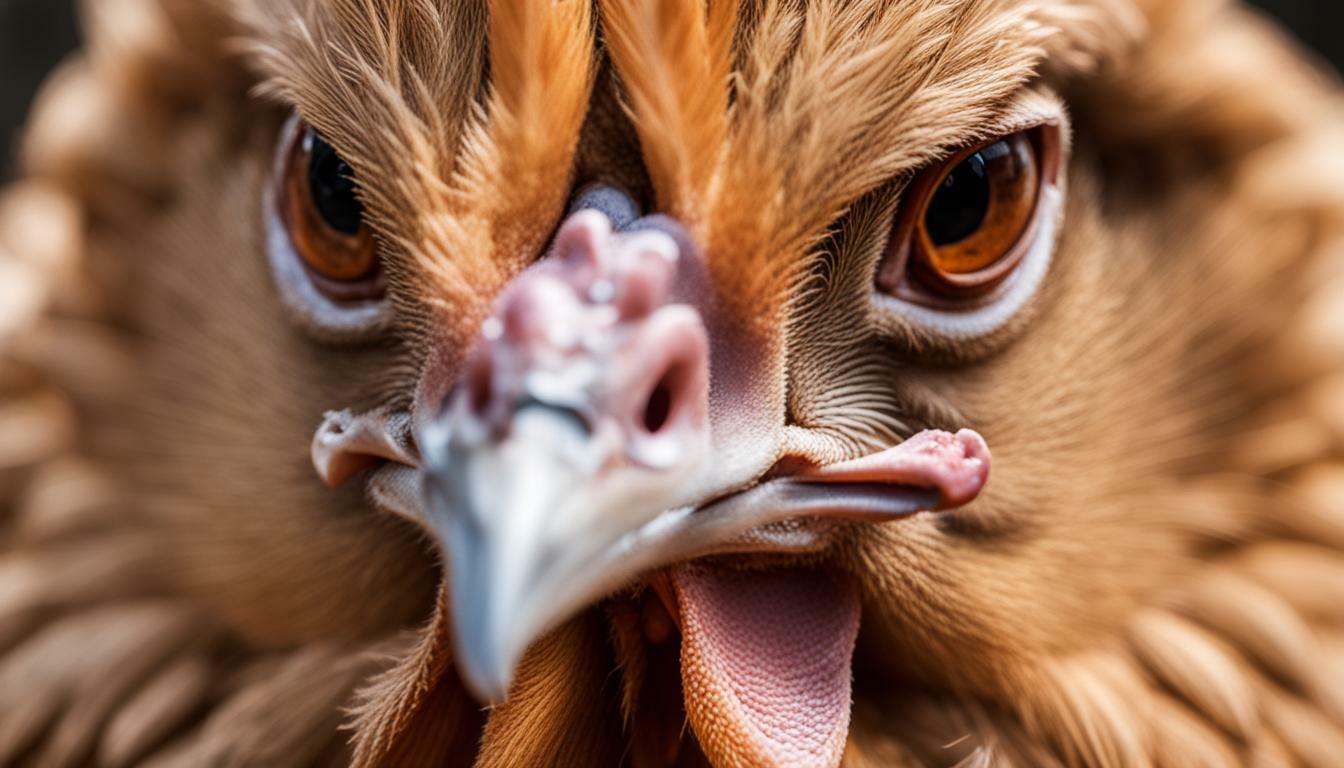Have you ever wondered how chickens feel when you take their eggs? As it turns out, chicken behavior is more complex than you might expect, and chickens can actually display emotional responses to a variety of situations, including egg removal.
Understanding the emotional intelligence of chickens is an important part of ensuring their welfare in a variety of settings, and can help farmers and backyard chicken keepers create a more positive and healthy environment for their flocks.
Key Takeaways:
- Chicken behavior is more complex than many people think.
- Chickens can display emotional responses to a variety of situations, including egg removal.
- Understanding chicken behavior and emotional intelligence is important for ensuring their welfare in a variety of settings.
Understanding Chicken Nesting Behavior
Chickens have a natural instinct to lay their eggs in a safe and secluded place. This behavior stems from their wild ancestors who laid their eggs in hidden nests to protect them from predators. In domesticated chickens, this behavior is still deeply ingrained, and they will spend a significant amount of time searching for the perfect nesting spot.
When a chicken is ready to lay an egg, she will often become restless and search for a suitable location. She may pace back and forth, vocalize, and even scratch at the ground in an attempt to create a suitable nesting spot. Once she finds a spot she likes, she will settle in and begin the egg-laying process.
The egg-laying process is a complex sequence of events that typically takes around 25 hours to complete. It starts with the development of a yolk in the hen’s ovary. Once the yolk is fully developed, it is released into the oviduct, where it will begin to develop into an egg. As the egg moves through the oviduct, several layers are added, including the egg white, shell membrane, and finally, the hard outer shell.
Once the egg is laid, the chicken will often spend time arranging the nest and covering the eggs with nesting material. This behavior not only helps keep the eggs safe and warm, but it also helps prevent other chickens from disturbing the eggs or stealing them.
Understanding chicken nesting behavior is essential for ensuring the welfare of your birds. Providing suitable nesting boxes in a quiet and secluded location can help reduce stress and anxiety in your chickens, leading to healthier and happier birds. Additionally, collecting eggs regularly can help prevent broodiness and encourage continued egg production.
Emotional Intelligence in Chickens
Many people assume that chickens are simple-minded creatures without the capacity for complex emotions. However, research has shown quite the opposite. Chickens are intelligent and social animals with a strong sense of empathy and recognition of their own emotions.
One of the ways in which chickens exhibit emotional intelligence is in their ability to read the emotions of other birds. They are sensitive to changes in the body language and vocalizations of their flock-mates, and can tell when another chicken is upset, frightened, or in pain. This allows them to respond appropriately and provide comfort and support to their comrades when needed.
Chickens also exhibit empathy towards other species, including humans. Studies have shown that chickens are capable of recognizing and responding to human emotions, and can even distinguish between friendly and unfriendly human faces. This suggests that chickens have a remarkable level of emotional intelligence that is often overlooked.
It is important for us to recognize the emotional intelligence of chickens and consider their welfare when raising them. By providing them with adequate space, socialization opportunities, and proper care, we can ensure that they live happy and fulfilling lives.
In conclusion, chickens are not the simple-minded creatures that many assume them to be. They possess a high level of emotional intelligence that allows them to empathize with others and respond appropriately to their emotions. By recognizing this and prioritizing their welfare, we can give these animals the respect and care they deserve.
The Chicken Reproductive Cycle
Understanding the chicken reproductive cycle is essential to gaining insight into chicken egg production. The cycle begins when a hen reaches sexual maturity, which is typically around 5-6 months of age.
During the reproductive cycle, the hen’s body undergoes several changes. The ovary develops and releases a yolk, which travels down the oviduct and is fertilized by sperm from a rooster if available. If the egg is not fertilized, it will still be laid but will not hatch into a chick. Once the egg is fertilized, it takes approximately 21 days for it to hatch.
After laying an egg, a hen’s reproductive system takes approximately 25 hours to produce another egg. This means that on average, a chicken will lay one egg per day. However, factors such as breed, age, and environment can impact egg production.
| Reproductive Phase | Description |
|---|---|
| Egg Formation | The process of yolk development, ovulation, and egg formation in the oviduct. |
| Broodiness | The natural maternal instinct of hens to incubate their eggs and care for their chicks. |
| Egg Laying | The physical act of laying eggs, typically one per day. |
| Resting | A period of decreased egg production when the hen’s body needs time to recover. |
It’s important to note that egg production can cause a significant strain on a hen’s body. Over time, this strain can lead to decreased production and even health problems. As such, it’s essential to provide hens with proper nutrition and a stress-free environment to ensure their welfare and continued egg production.
Understanding the chicken reproductive cycle and providing proper care are crucial factors in maintaining healthy and productive egg-laying hens.
Do Chickens Get Upset When You Take Their Eggs?
As a chicken owner, you may be wondering if your feathered friends get upset when you collect their eggs. After all, chickens are living creatures with their own emotions. While it may seem like a simple task, removing eggs from a chicken’s nesting box can have an impact on their emotional well-being.
Chickens are known to become attached to their eggs and the nesting boxes where they lay them. They may even display protective behavior over their eggs, such as sitting on them to keep them warm and safe. So, when you remove their eggs, it is natural for them to feel a sense of loss and confusion.
However, the emotional response of chickens to egg removal can vary depending on several factors. Some chickens may not be affected at all, while others may become agitated or distressed. It is important to pay attention to your chickens’ behavior and adjust your egg-collection routine accordingly.
How to Minimize the Emotional Impact of Egg Removal
To reduce the emotional impact of egg removal, there are several things you can do:
- Collect eggs regularly: By removing eggs on a regular schedule, your chickens will become accustomed to the routine and will be less likely to become distressed.
- Provide plenty of nesting boxes: Giving your chickens ample space to lay their eggs can reduce overcrowding and competition for nesting spots, which can lead to stress and negative behavior.
- Offer treats: Providing your chickens with treats after you collect their eggs can help create a positive association and reduce any negative emotions they may be feeling.
Remember, while egg collection may seem like a simple task, it is important to consider your chickens’ emotional well-being. By implementing some simple strategies, you can help minimize the negative impact of egg removal and create a happy and healthy environment for your feathered friends.
Conclusion
In conclusion, chickens are fascinating creatures with complex behavioral patterns and emotional responses. Understanding chicken behavior is crucial for ensuring their welfare and optimizing egg production.
Removing eggs from chicken nests is a common practice, and while chickens may exhibit some level of distress, they are not capable of feeling human-like emotions. However, it is important to handle eggs gently and avoid disturbing the hens unnecessarily.
By observing and respecting their natural nesting behavior, providing adequate space and resources, and monitoring their reproductive cycles, you can ensure that your chickens are healthy and happy, and that you’re getting the most out of their egg-laying capabilities.
Remember to:
- Observe and respect natural chicken behavior.
- Handle eggs gently and avoid disturbing the hens unnecessarily.
- Provide adequate space and resources for your chickens.
- Monitor your chickens’ reproductive cycles.
By following these guidelines, you can ensure that your chickens lead happy and productive lives, while also enjoying the benefits of fresh, delicious eggs.
Does Molting Affect a Chicken’s Appetite?
During chickens’ molting and reduced appetite, it is common for their hunger levels to decrease. Molting is a natural process where feathers are shed and replaced. Due to the energy required for feather regrowth, chickens may experience reduced appetite. Ensuring a balanced diet and providing nutritional supplements can support them during this phase.
FAQ
Q: Do chickens get upset when you take their eggs?
A: Chickens do not have the same emotional response as humans when it comes to egg removal. They have been bred over thousands of years to lay eggs and it is a natural part of their reproductive cycle. However, it is important to provide a comfortable and stress-free environment for chickens to ensure their overall welfare.
Q: What is chicken nesting behavior?
A: Chicken nesting behavior refers to the instinctual behavior of chickens to find a suitable place to lay their eggs. This behavior is important for the survival of their offspring. Chickens will often seek out quiet and secluded areas to create a nest and lay their eggs.
Q: How does the egg-laying process work in chickens?
A: The egg-laying process in chickens begins with the development of an egg inside the hen’s body. Once the egg is fully formed, the hen will find a nesting spot and prepare the area by scratching and creating a nest. She will then lay the egg and cover it with nesting material. The process typically takes about 24-26 hours, and hens will continue to lay eggs every day or every other day.
Q: Do chickens have emotional intelligence?
A: While chickens may not possess the same level of emotional intelligence as humans, they are social animals that can recognize and respond to emotions in their flockmates. They can form strong bonds with other chickens and exhibit behaviors that indicate empathy and understanding.
Q: What is the chicken reproductive cycle?
A: The chicken reproductive cycle involves the development and release of eggs by hens. It starts with the maturation of eggs inside the hen’s body. Once the egg is fully formed, it is released through the process of ovulation. After the egg is released, the hen will go through the nesting behavior and lay the egg. This cycle repeats every 24-26 hours, with hens laying eggs consistently during their laying period.
Q: What should I consider when removing eggs from a chicken coop?
A: When removing eggs from a chicken coop, it is important to handle them with care to avoid cracking or damaging the eggs. It is also important to maintain cleanliness in the coop to prevent the spread of bacteria. Providing a comfortable and stress-free environment for the chickens will help ensure their overall well-being.











